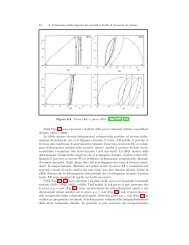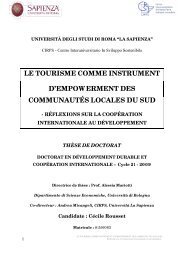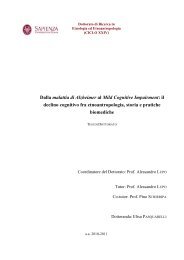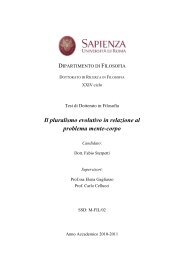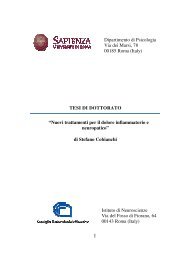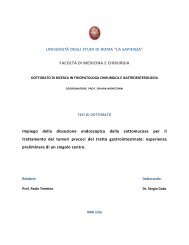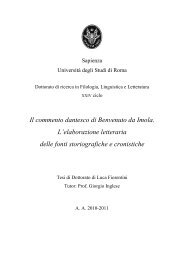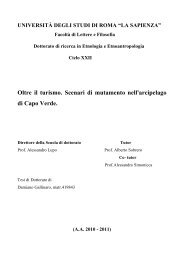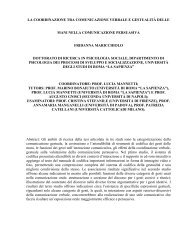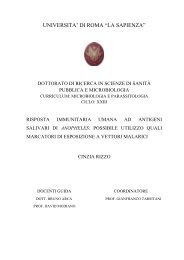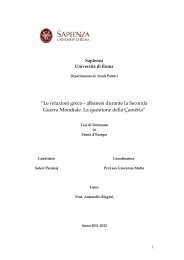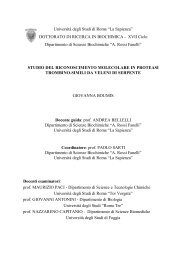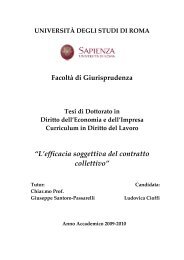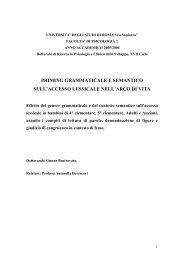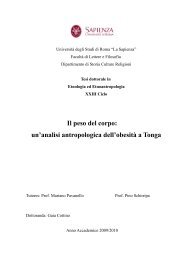Create successful ePaper yourself
Turn your PDF publications into a flip-book with our unique Google optimized e-Paper software.
78<br />
Capitolo secondo<br />
Dalla fissità del carattere di Antigone, la sua fedeltà ai propri principi e<br />
al nomos 36 della parentela, dipende il suo displacement rispetto alla con-<br />
tingenza storico-politica. Con l’affermazione che “the stable, the <strong>per</strong>ma-<br />
nent, the original human being is to be found there” il saggio di Woolf<br />
“On Not Knowing Greek” fornisce una lettura ontologica del mito (in<br />
risposta, cioè, alla domanda sull’essenza dell’uomo). Altrove Woolf pre-<br />
dilige una interpretazione più politica, pratica e attualizzante della tra-<br />
gedia greca: lo dimostra il fatto che “in no single published work of Vir-<br />
ginia Woolf is the Antigone a more important foundation for her thought<br />
than in Three Guineas” 37 . Antigone fa la sua apparizione nella seconda<br />
parte dell’o<strong>per</strong>a più propriamente politica di Woolf:<br />
The Antigone of Sofocles has been done into English prose or<br />
verse by a man whose name is immaterial. Consider the<br />
character of Creon. There you have a most profound analysis<br />
by a poet, who is a psychologist in action, of the effect of power<br />
and wealth upon the soul. Consider Creon’s claim to absolute<br />
rule over his subjects. That is a far more instructive analysis of<br />
tyranny than any our politicians can offer us. You want to know<br />
which are the unreal loyalties which we must despise, which<br />
are the real loyalties which we must honour? Consider<br />
Antigone’s distinction between the laws and the Law. That is a<br />
36 La parola greca nomos, deriva da nemein, che significa “possedere” e “abitare”<br />
e denota inizialmente i confini della proprietà. Cfr. HANNAH ARENDT, The Human<br />
Condition, cit., p. 63 n. 62. Ancora in fase ancora arcaica passò a indicare la legge in<br />
quanto espressione di un ordine divino, <strong>per</strong> cui trasgredire al nomos rappresenta un<br />
sacrilegio. Con la fondazione della polis, <strong>per</strong>ò, pur conservando la sua validità di<br />
legge universale, il nomos <strong>per</strong>de la sua accezione di legge imposta dall’esterno <strong>per</strong><br />
assumere quella della legge stabilita dall’assemblea. Antigone segna appunto il passaggio<br />
verso quest’ultima fase. Cfr. FRANCESCA BREZZI, op. cit., p. 80sgg.<br />
37 SYBIL OLDFIELD, op. cit., p. 54.



